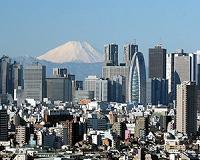 |
Moscow (AFP) March 24, 2011 Russia on Thursday was checking a cargo ship that arrived in its Far East with radiation levels three times the norm after passing close to Japan's quake-damaged Fukushima nuclear plant. The quarantining of the Panama-flagged vessel on the Pacific coast of the Khabarovsk region came as Russia banned the import of food from four Japanese regions amid continued concern about the situation in its neighbour. The ship had delivered a cargo of plywood to Japan and had then passed close to the quake-damaged nuclear power plant at Fukushima on its return voyage, the head of Russia's consumer protection agency Gennady Onishchenko said, the Interfax news agency reported. It was then inspected by Russian officials Wednesday after arriving in Russian waters off the port of Vanino. "In the cabins of the ship the level of gamma-radiation was within the norm but in the engine rooms it was three times higher," he said. He said that it was believed the radiation had passed into the engine rooms through a ventilator. The ship has been placed in quarantine and its crew of 19 have been put under medical supervision, he said. "No changes of health have been noticed in the crew" who consist of 18 Russians and one Ukrainian, he added. Heavily-populated parts of Russia's Far East region lie just 1,000 kilometres (600 miles) to the west of the nuclear plant and inhabitants have been seen panic-buying dosimeters that measure the amount of radiation as well as iodine. However officials have insisted there is no sign of radiation in the region exceeding normal levels, a position reaffirmed by Onishchenko. He said that Russian officials had so far not detected any higher radiation on foodstuffs from Japan. But nonetheless Russia has banned the sale and import of food from four Japanese regions amid particular concern about plant products, he added. "We have given orders to fully ban the use of food products which have been brought into Russia after March 11 from Fukushima, Ibaraki, Tochigi and Gunma," Onishchenko told Interfax. He was quoted as saying that food from these four provinces would now be stopped at the border even without radiation checks. Meanwhile, the RIA Novosti news agency also said imports had been banned from another two regions -- Chiba and Nagano. Onishchenko said that due to information about higher radiation in water in the Tokyo region, Russian airlines had been ordered not to take on water in Tokyo and take sufficient amounts for the return trip. The meteorological service has said that radiation levels were within the normal limits throughout the Far East but the military has emphasized it could evacuate the Pacific Kuril and Sakhalin islands at short notice should the need arise. The main city of the Russian Far East Vladivostok is no more than 1,000 kilometres west of the Fukushima nuclear plant while the southernmost island in the Kuril islands is barely 700 kilometres north.
Share This Article With Planet Earth
Related Links Space Technology News - Applications and Research
 Tokyo water unsafe for babies, food bans imposed
Tokyo water unsafe for babies, food bans imposedTokyo (AFP) March 24, 2011 Tokyo warned Wednesday that radioactive iodine over twice the safe level for infants had been detected in its tap water after Japan's massive earthquake crippled a nuclear plant. The revelation came after the United States barred imports of dairy and other produce from areas near the Fukushima power station, and as the Chinese territory of Hong Kong became the first Asian economy to follow s ... read more |
|
| The content herein, unless otherwise known to be public domain, are Copyright 1995-2010 - SpaceDaily. AFP and UPI Wire Stories are copyright Agence France-Presse and United Press International. ESA Portal Reports are copyright European Space Agency. All NASA sourced material is public domain. Additional copyrights may apply in whole or part to other bona fide parties. Advertising does not imply endorsement,agreement or approval of any opinions, statements or information provided by SpaceDaily on any Web page published or hosted by SpaceDaily. Privacy Statement |